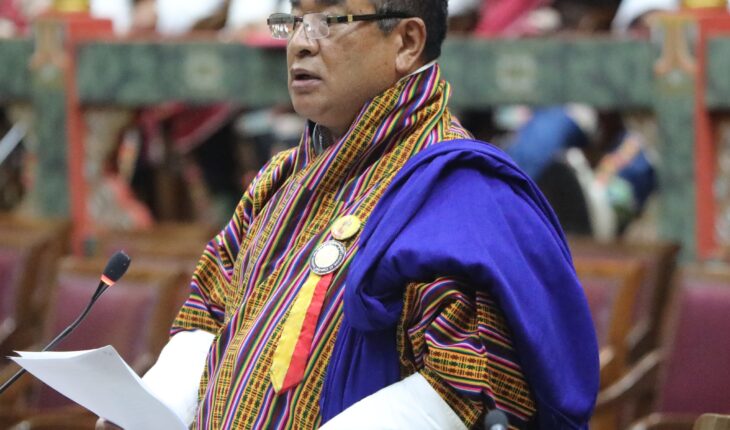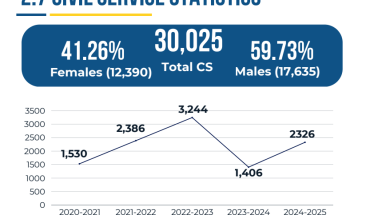KINZANG DORJI TSHERING
Thimphu
The Thrimshing-Kangpara Member of Parliament, Damche Tenzin, drew national attention to the issue of disparity in salary structure between consolidated (contract) teachers and their regular counterparts within the teaching cadre.
The MP raised the matter to the Minister of Education and Skills Development, stating that contract teachers shoulder responsibilities equal to those of regular teachers, yet continue to face discrimination in terms of remuneration and benefits.
MP Damche Tenzin emphasized that contract teachers are involved in all aspects of the teaching profession—classroom instruction, lesson planning, student assessment, and extracurricular supervision—yet they are not accorded the same financial recognition or job security as regular teachers.
He stated that this difference in treatment, despite the equality in workload and responsibilities, constitutes what he called a clear ‘discrimination’ within the national pay structure.
During the session, he questioned the fairness of the current system, suggesting that such disparity sends the wrong message to the teaching community and could discourage talented individuals from remaining in or joining the profession.
His remarks reflected the broader frustration among consolidated teachers across the country, who have long voiced concerns about job insecurity and the lack of incremental benefits available to their regular peers.
Responding to the query, the Minister of Education and Skills Development Yezang De Thapa acknowledged the concerns raised and clarified the limitations of the Ministry’s authority in this matter. The Minister stated that the salary structure for civil servants, including teachers, is determined by the Royal Civil Service Commission (RCSC), not the Ministry.
She added that the Ministry of Education and Skills Development does not have the legal teeth to alter or revise pay scales or employment categories on its own.
The minister further informed the House that discussions with the RCSC regarding the employment terms of consolidated teachers are ongoing.
She noted that while the Ministry is aware of the challenges faced by contract teachers, particularly with regard to financial and professional insecurity, any systemic change would require approval from the RCSC.
The issue of consolidated teachers and their role in Bhutan’s education system is not new. Thousands of teachers in Bhutan serve under contract terms, especially in remote and difficult-to-staff areas.
While their contributions are often vital to the functioning of schools, they remain excluded from several benefits granted to regular teachers. This includes not only lower pay but also the absence of annual increments, limited access to professional development opportunities, and challenges in obtaining financial services such as bank loans due to the temporary nature of their contracts.
The government, in its broader reform agenda, has indicated its willingness to regularize contract employees across sectors. However, progress has been slow due to differences between the executive and the RCSC.
The RCSC has proposed a para-regularisation model in which both regular and consolidated contract employees would be placed into a new “para-regular” category. This category would offer partial job security and a defined pathway to regularization over a period of five years.
The government, however, has proposed extending the regularization period to eight years, arguing that a longer transition time would provide better security and sustainability for those affected.
At the heart of this debate is a difference in governance philosophy. While the government seeks to improve job stability for thousands of contract workers, the RCSC emphasizes the need to uphold meritocracy, efficiency, and institutional independence in civil service recruitment.
The RCSC has also publicly stated that any move to convert contract employees into regular ones without clear assessment criteria could undermine the competitive nature of civil service entry.
In an effort to address the underlying issues faced by contract teachers, the Ministry of Education and Skills Development has also announced plans to establish a National Teaching Service (NTS) by 2025.
The initiative, developed in collaboration with the RCSC, aims to create a standardized pathway for entry and progression within the teaching profession.
Under the proposed NTS framework, all teaching candidates—including those already serving on a contract basis—would be required to complete a Postgraduate Diploma in Education (PGDE) through a blended learning format.
In addition, they would need to pass the Teaching Service Eligibility Test (TSET), a national examination designed to ensure minimum professional standards.
According to the Ministry, the NTS will not only address disparities in employment terms but also raise the overall quality and consistency of education delivery across the country.
It is envisioned as a system that aligns teacher recruitment and professional development with national standards, regardless of whether the teachers are initially hired on a contract or regular basis.
Despite these policy intentions, implementation remains a challenge. Many contract teachers currently serving in schools—especially those in remote areas—may find it difficult to meet the academic and logistical demands of PGDE programs and national exams while continuing their day-to-day teaching duties.
Moreover, questions remain about how the NTS will accommodate existing teachers who have already served for many years under consolidated terms.
For many teachers, the current arrangement contributes not only to financial hardship but also to a feeling of professional exclusion. They argue that the lack of a clear pathway to regularization or promotion demotivates them from investing in long-term service.
Furthermore, contract teachers have voiced concerns about being overlooked for training and other professional development programs, further widening the gap between them and their regular counterparts.
Observers say as the government and the RCSC continue to deliberate on long-term solutions, including the full rollout of the NTS and the future of para-regularisation, the voices of those affected—particularly those of the teachers on the ground—remain critical.
MP Damche Tenzin concluded his remarks by urging the Ministry and all relevant agencies to seriously consider the implications of continued disparity and act swiftly to ensure that teachers across the country are treated equitably.
“We must remember that at the heart of our education system are our teachers—whether contract or regular—and their contributions are equally vital,” he said.





